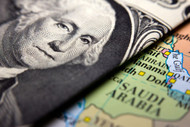Saudi Arabia ends petrodollar agreement: What it means for the USD, Bitcoin, and gold
Jun 14, 2024
(Kitco News) – The established financial world order of the past 50 years is now transitioning to a new and unknown paradigm as the petrodollar agreement between the U.S. and Saudi Arabia was allowed to expire this past Sunday.
The term ‘petrodollar’ described the U.S. dollar’s (USD) role as the currency used for crude oil transactions on the world market. It traces back to the early 1970s, when the United States and Saudi Arabia struck a deal shortly after the U.S. went off the gold standard – and the agreement has had far-reaching consequences for the global economy.
The petrodollar agreement came about following the 1973 oil crisis. It stipulated that Saudi Arabia would price its oil exports exclusively in U.S. dollars and invest its surplus oil revenues in U.S. Treasury bonds. In exchange, the U.S. provided military support and protection to the kingdom.
This helped the USD cement its position as the world’s reserve currency and ushered in an era of prosperity for Americans as they enjoyed the benefits of being the preferred market for global corporations to sell their wares. Additionally, the inflow of foreign capital into U.S. Treasury bonds has supported low-interest rates and a robust bond market.
All that is set to change now, as Saudi Arabia is looking to move beyond an exclusive relationship with the U.S. – as shown by the kingdom becoming one of the newest members of the BRICS bloc.
While many point to escalating global tensions and shifting geopolitical allegiances as the impetus for allowing the agreement to expire. However, changes in the power dynamics of the global oil market have also played a crucial role in this development as the world moves towards alternative energy sources.
The rise of renewables and natural gas has been steadily reducing the world’s reliance on oil for the past decade, and even oil-rich countries like Saudi Arabia have evolved.
The Kingdom is on track to generate half its electricity with renewables and natural gas by 2030 and plans to plant 10 billion trees as part of a larger goal to reach net-zero emissions by 2060. To achieve this, they have implemented more than 80 public and private sector initiatives, representing an investment of over $188 billion.
Their decision to go in that direction has also been influenced by the emergence of new oil-producing nations, such as Brazil and Canada, which have challenged the traditional dominance of the Middle East.
While many analysts have said that the threat to the USD’s status as the reserve currency is overblown, most acknowledge that the end of the petrodollar agreement has the long-term potential to weaken the USD. By extension, U.S. financial markets.
At present, the Kingdom is still accepting U.S. dollars in exchange for oil, but some of the world’s largest economies are trying to change that, notably China. For years, China has been actively trying to get Saudi Arabia to accept the yuan for oil purchases, and while the Kingdom has thus far refrained from making the switch, they have expressed openness to the idea.
According to digital news service Sputnik, “Nearly 80 percent of global oil sales are priced in dollars. However, Russia, Iran, Saudi Arabia, China, and others are increasingly shifting to local currencies in energy trade. In 2023, 20 percent of global oil was bought in other currencies, as per the Wall Street Journal.”
The Kingdom’s acceptance into the BRICS bloc has the potential to influence this decision. If Saudi Arabia moves to expand beyond the USD, it will materially weaken the currency’s dominance in the oil market – and as a result, its place on the world stage. A decline in global demand for the greenback could result in higher inflation, higher interest rates, and a weaker bond market in the United States.
Sputnik said, “If world players significantly reduce the use of US dollars, the US' ability to issue dollar debt and earn dollars for exports will diminish and the nation's economy will shrink, according to international economists.”
The primary reasons for not making the switch at this point are the stability and the global acceptance of the U.S. dollar. While the USD-for-oil existing state of affairs stays in effect for now, the end of the petrodollar agreement stands for a significant shift in global power dynamics and highlights the changing energy landscape and the growing influence of emerging economies.
Evidence that the U.S. understands the importance of maintaining a strong relationship with Saudi Arabia can be found in reports that the Biden administration is close to finalizing a treaty with the Kingdom. The treaty would commit the U.S. to help defend them as part of a deal aimed at encouraging diplomatic ties between Saudi Arabia and Israel.
As reported by Reuters, “The possible deal, widely telegraphed by U.S. and other officials for weeks, is part of a wider package that would include a U.S.-Saudi civil nuclear pact, steps toward the establishment of a Palestinian state and an end to the war in Gaza, where months of ceasefire efforts have failed to bring peace.”
The treaty, known as the Strategic Alliance Agreement, would require a two-thirds majority vote in the U.S. Senate to be approved. According to U.S. and Saudi officials, the draft treaty is modeled loosely on Washington's mutual security pact with Japan.
In exchange for the U.S. commitment to defend Saudi Arabia in an attack, the draft treaty would grant Washington access to Saudi territory and airspace to protect U.S. interests and regional partners, according to the Wall Street Journal.
Effect on USD, Bitcoin and gold
“The end of the US-Saudi petrodollar agreement would likely have a minimal effect on the USD,” said Daniel Krupka, Head of Research at Coin Bureau, in a note to Kitco Crypto. “This is because Saudi Arabia would likely convert the non-USD currencies it's receiving for oil payments into the USD anyway.”
“Although a BRICS currency may have some level of adoption, it would not be able to achieve a level of adoption similar to that of the USD, gold, or Bitcoin without being backed by a stable economy,” he added. “Neither party benefits from the end of the agreement in the short term, as it effectively just complicates things. In the long term, it could make Saudi Arabia less reliant on the USD, depending on what the country does with its non-USD proceeds.”
Touching on the draft defense treaty, Krupka said it “may maintain the bilateral relationship at the strategic level, but it does not directly replace the economic aspect of the petrodollar deal.”
He also noted that the “Saudi Riyal is pegged to the USD,” which means that “Saudi Arabia needs USD to support its currency.”
“However, the end of the agreement could be bad for the USD insofar as Saudi Arabia decides to convert these non-USD currency proceeds into other assets, such as gold or BTC,” Krupka suggested. “More diversification of Saudi assets into gold or Bitcoin could help push up prices, although this is contingent on the extent of diversification.”
“The symbolism of the end of the US-Saudi petrodollar agreement marks a shift toward a future that is further economically and geopolitically fragmented,” said Brian Mahoney, co-founder of Acre, in a note shared with Kitco Crypto. “It means that the world’s currency for top energy assets like oil is no longer priced just in dollars, opening the door to alternative assets instead.”
“Bitcoin would make sense as an asset to be explored for adoption going forward given its ties to energy companies (through its proof of work consensus mechanism) and the fact that it is the top digitally native asset by market cap in an increasingly digital global economy,” he added.
While the details on the future of a BRICS currency are scant, Russian President Vladimir Putin said yesterday, “Within BRICS, we’re working on shaping an independent payment system, free from political pressure, abuse, and external sanctional interference.”
Some have proposed that a BRICS currency could be backed by a basket of commodities, of which gold would be a part – which would likely benefit gold prices.
Most analysts hold the position that it will be years before the USD loses its reserve currency status, but X user Bullion Buzz highlighted the ongoing ramp-up in the transition away from Western currencies amid the rise in geopolitical tensions.
Jaime Carrasco, Senior Investment Advisor and Senior Portfolio Manager at Canaccord Genuity Financial said, “What is important to every Western investor is the fact that the #Petrodollar is being replaced in #oil sales with the #gold convertible #Petroyuan contract, and I'm sure Saudi Arabia the UAE and Iran, like Russia, will be glad to accept #gold in trade settlement for their oil instead of USD.”
In response to a post from Gold Telegraph highlighting that “Gold has overtaken the euro in global international reserves,” Carrasco said, “Great infographics which begs one question, at what price will it be when it overtakes the mighty USD?”
He also noted that “Saudi Arabia has announced that they will be joining Bank of International Settlements’ bridge payment system and thus leaving the Petrodollar system as the only payment system for energy.”
And X user Doctor Profit said the end of the agreement would lead to more debt printing in the U.S., ultimately leading to increased inflation.
“It’s a more long-term rise,” he added. “Effects from this change will be seen in 8–12 months from today. The outcome is rising inflation and higher prices for everything, including stocks, BTC, real estate, and gold.”

